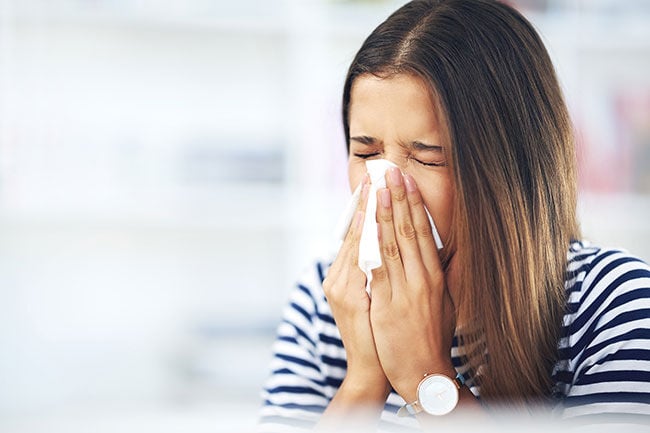
What You Need for Allergy Season
This post contains affiliate links to products and services. We may receive compensation when you click on links.
Itchy eyes, runny nose, tiredness, scratchy throat—these are the signs of seasonal allergies. They usually strike around the same time every year and by now you’re probably pretty adept at recognizing the early signs.
But what can you do about them?
Well, in this guide, we’ll look at some of the things you can buy to prepare for this seasonal war. It’s an allergy kit, and it’ll make sure you’re ready to tackle allergy symptoms the next time they strike.
What are Seasonal Allergies?
Also known as allergic rhinitis or hay fever, seasonal allergies are allergic reactions that occur at specific times of the year when pollen and mold spores are released into the air. If you suffer from seasonal allergies, it means your body is treating these allergens as a threat and reacting by releasing more histamine. It is the histamine that causes the symptoms of seasonal allergies.
When is allergy season?
There is no single allergy season. There are actually three of them, and it largely depends on where you live and how prevalent allergens are in your area.
In most parts of the United States, spring is the biggest offender, and spring seasonal allergies usually begin anywhere from late Feb to mid-March. They continue until the summer.
In the summer, many varieties of grass release pollen and cause seasonal allergies. Ragweed is one of the worst offenders and usually reaches peak pollination from late summer to early fall.
Ragweed is also the main culprit during fall, prolonging the suffering of people with seasonal allergies.
What are the symptoms?
Some of the most common symptoms of seasonal allergies include:
- Itchy, red, or watery eyes
- Itchy throat or nose
- Runny nose
- Stuffy nose
- Scratchy throat
- Headaches
- Sneezing
- Postnasal drip
- Loss of smell
- Dry cough
- Fatigue
- Nasal congestion
What are the causes?
Allergy symptoms occur when the body overreacts to allergens. The allergens are seen as a threat and the body reacts accordingly. The severity of the symptoms will be determined by the degree of perceived threat, which is why some people have very minor reactions and others feel like they are unable to breathe.
How to Properly Prepare for Allergy Season
Millions of Americans have seasonal allergies, but not everyone recognizes them. Some dismiss them as colds and flu. Others have mild symptoms and just think they’re a little rundown. If you’re reading this article, though, there’s a good chance you know you have allergies and are ready to fight them.
Here’s how to do that:
Take an allergy test
An allergy test will tell you exactly what you’re allergic to, so it’s always the best place to start.
Allergy tests are skin tests that are perfectly safe and will tell you if you’re allergic to common allergens. They are available as skin prick tests, intradermal tests, and patch tests, all of which expose you to common allergens in a safe and measurable way.
Stock up on allergy medications
Make sure you have plenty of medications to counter your allergies. You can buy oral antihistamines like cetirizine (Zyrtec Allergy), loratadine (Claritin, Alavert), and fexofenadine (Allegra Allergy) over the counter and should also consider oral decongestants like pseudoephedrine (Sudafed).
Always read the leaflet and follow the advice on the label.
Buy some nasal sprays
There are a few different types of nasal sprays that could help.
Corticosteroid nasal spray may improve sinus-related symptoms and it is available over the counter. Avoid using it to excess though, as it can cause nasal dryness and may worsen some other symptoms over time.
If you suffer from nasal dryness, pick up some saline nasal spray. It will moisten and protect the delicate membrane inside your nose and could reduce the risk of nosebleeds.
Buy a humidifier
If the saline nasal spray isn’t enough, or you’re not keen on the idea of squirting a saline solution up your nose, consider a humidifier. It introduces moisture into the air and keeps your nasal passages moist. It won’t prevent your allergy symptoms, but it could make them more manageable.
Prepare for nosebleeds
For many allergy sufferers, nosebleeds are a fact of life. Not only are the nasal passages very dry, but all that congestion leads to rubbing, sneezing, and nose blowing, and that places a lot of strain on the delicate blood vessels inside the nose.
Don’t panic if you have a nosebleed or two during allergy season and make sure you’re prepared to deal with them. Just sit straight, lean forward, pinch the soft part of your nose, and wait for 10 minutes.
It helps to keep a box or two of Nampons on standby as well. They soak up the blood, stop the bleeding, and are convenient enough to keep in medicine cabinets, first aid boxes, handbags, and glove compartments.
Change your air filter
You should replace the filter on your air conditioning every few weeks at least, thus ensuring that all of those allergens are not recirculating.
What to Do During Allergy Season
Once those seasonal allergy symptoms are underway, the preparation is over and the battle begins! Here are a few things you can do to make the season more tolerable.
Track your symptoms in a journal
The more you know about your symptoms and their triggers, the easier it will be to prevent them. So, whenever you feel the unmistakable signs of allergic rhinitis, make a note of the date, the symptoms, and the potential causes.
Stay clear of triggers
Once you know what triggers your allergies, whether it’s pet dander, dust mites, or pollen, you can try to avoid them. Obviously, that’s often easier said than done, but the goal is to reduce your exposure and not necessarily avoid it completely.
Do a spring clean
Clean your home thoroughly and regularly to remove allergens like mold, dust, and hair. If you spend a lot of time indoors, as many of us do these days, you’ll be inhaling allergens with every breath and constantly aggravating your symptoms.
Wear a mask when exposed to allergens
A few years ago, you might have felt a little strange walking around in a face mask. These days, it’s perfectly normal. And that’s great news for your allergies, as a facemask can provide some protection against airborne allergens.
Shower after being exposed
A quick shower will remove pollen particles, pet dander, and other allergens from your skin after you have been exposed.
Focus on your diet
When it feels like your immune system is in revolt, it’s normal to let your diet go astray. You don’t eat as cleanly as you should or drink as much as you need, and your health suffers more as a result.
You might not feel like it but try to eat healthily and drink plenty of water throughout the day.
Get plenty of sleep
Sleep, like diet, is a key component for keeping your immune system strong and healthy. It’ll ensure you’re better prepared to deal with your symptoms and won’t feel defeated by them.
See an allergist
If your allergy symptoms persist or seem to be getting worse, speak with an allergist. They can help you find relief by diagnosing the issue, addressing the causes, and finding effective solutions.
FAQs
Is there a way to get rid of seasonal allergies for good?
Unfortunately, no. However, with some simple lifestyle changes (sleep more, eat well, avoid allergens) and medications, you could reduce them to the point where they are no longer a major burden.
Can I calm my allergies down without medicine?
Yes, although there are no quick and easy solutions. Try to avoid allergens, keep your nasal passages moist, and drink lots of fluid. If the symptoms persist, speak with an allergist.
Does vitamin C help with allergies?
The effects of vitamin C are often greatly exaggerated, especially when it comes to colds and flu. However, there is some evidence to suggest that it could act as a natural antihistamine, thus relieving some allergic symptoms. It’s also safe and cheap.
Conclusion: Preparing for Seasonal Allergies
PARTNER CONTENT
Properly treating allergies requires a little preparation, some essential supplies, and a lot of allergy medications. It’s a struggle, but eventually, you’ll find what works for you and will find the relief that you need when those seasonal symptoms strike.
Related Content
- What Causes Nosebleeds?
- 5 Ways to Stop a Nosebleed
- How to Make a Child’s First Aid Kit
- When to Worry about a Nosebleed
- What You Need for Allergy Season



















